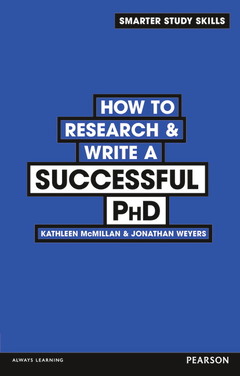How to Research & Write a Successful PhD Smarter Study Skills Series
Auteurs : McMillan Kathleen, Weyers Jonathan

A practical, step-by-step guide to postgraduate study, covering the whole research process from planning to writing up and beyond.
Undertaking a large-scale original research project involves choosing an appropriate topic, planning and carrying out the research, and analysing and writing up the data and conclusions. At PhD level, these steps can be challenging for any student. Using the tried-and-tested approach, style and pedagogy of the Smarter Student series, this text delivers timely, practical, hands-on guidance based on real-life experience from students and supervisors alike.
The book guides the student through all of the key aspects of being a researcher and delivering a successful PhD thesis. It is an invaluable tutorial and reference for those entering academic life at doctoral level, providing practical guidance, examples and tips for success.
Introduction
1. Taking on postgraduate studies - preliminary considerations
2. Principles of postgraduateness – how to approach study at this new level
Getting started
3. Identifying and framing research questions – how to set targets and formulate hypotheses
4. Writing a proposal or research plan – how to outline your approach to postgraduate study
Key research skills
5. Developing as a researcher – appraising your skills and gaining proficiency
6. Planning and time management – how to complete your research and write up on time
7. Information literacy for PhD study – how to find relevant source material
8. Accessing content from the literature - how to read and evaluate research publications
9. Organising research materials – how to collect and file information and details of references
Interactions with others during a research programme
10. Student-supervisor relationships – how to make the most of this important collaboration
11. Dealing with the highs and lows of being a postgraduate – how to respond positively to events and feelings
12. Working in a research team – how to balance research cooperation and autonomy
13. Teaching as a postgraduate – how to make the most of opportunities to tutor, demonstrate and lecture
14. Giving a research seminar or paper – how to deliver an effective spoken presentation
15. Preparing and presenting a poster – how to summarise and communicate your findings
16. Being appraised – how to respond to progress monitoring and other feedback on your work
Research Methods
17. Critical thinking – how to apply method to arrive at valid, original ideas
18. Arriving at a position and supporting it – how to sift fact and opinion and express your conclusions
19. Research ethics and safety – how to conduct an appropriate, principled and safe investigation
20. Referencing, citing and avoiding plagiarism – how to refer appropriately to the results and ideas of others
21. Interpreting and presenting data – how to understand and produce graphs, tables and basic statistics
22. Aspects of qualitative research – how to obtain and analyse non-numerical information
23. Aspects of quantitative research – how to obtain and analyse numerical data
24. Experiments and field studies – how to design and conduct lab and field investigations
Writing up your research
25. Links between research, writing and speaking – how to gain from the interactions between investigation, communication and thought
26. The nature of scholarly writing - how to produce formal writing at PhD level
27. Scholarly writing style – how to construct effective academic text
28. Elements of a thesis – how to write up the different sections
29. Becoming an autonomous writer – how to take control of the writing process
30. Thesis presentation – how to submit your work in the appropriate manner
Examination and beyond
31. The PhD viva – how to prepare for and perform in your oral exam
32. Publishing your research – how to write and submit a successful paper
33. After your doctorate – how to make appropriate use of your qualification
Jonathan Weyers and Kathleen McMillan both work at the University of Dundee. Both have been teaching and lecturing for over 25 years and latterly have specialised in the transferable skills area. They have a track record of collaborative writing and achievement in this area.
Date de parution : 08-2013
Ouvrage de 424 p.
14.2x21.6 cm


